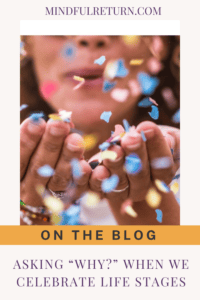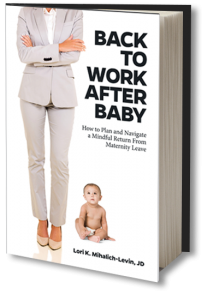 I’ve been thinking a lot about life stages lately. Not only about how we celebrate and mark the passing of time, but why. And about how we can be more fully present in celebrations as they happen. If I pause to look at my own life – my own calendar – it’s no wonder these questions are top of mind for me. Not only is it the holiday season, but today is my eldest son’s bar mitzvah. And my youngest is already planning out what he wants to do for his birthday in February.
I’ve been thinking a lot about life stages lately. Not only about how we celebrate and mark the passing of time, but why. And about how we can be more fully present in celebrations as they happen. If I pause to look at my own life – my own calendar – it’s no wonder these questions are top of mind for me. Not only is it the holiday season, but today is my eldest son’s bar mitzvah. And my youngest is already planning out what he wants to do for his birthday in February.
As my younger son pondered out loud what he might want to do to recognize his turning 11, he stopped for a moment and asked me, “Mommy, why do we celebrate birthdays?” My first response completely missed the mark, when I read his comment as not wanting to have a party. “You don’t have to have party if you don’t want to, sweetie,” I reassured him. “No, mommy, I DO want to celebrate. But WHY do we have parties? WHY do we do this thing called birthday celebrations? And why haven’t you had a birthday party lately?”
Oh, he was getting deep on me quickly! And he asked such excellent questions. Birthday parties, holiday gatherings, b’nai mitzvot, quinceañeras – they sometimes start to feel like “things we do, because we do them.” They’re often programmed into the landscape, and we don’t give them another thought.
But as the rabbi working with my older son to prepare him for his bar mitzvah asked him the first time we all met: “Why are we doing this?” And she kept asking why until we got deeper and deeper into the layers.
It turns out we could just celebrate things in our lives because that’s “how it’s done.” Or we could just do it for the performance – for Instagram, or because someone else expects us to. That surface-level of engagement is sometimes all we have the bandwidth for. I get it. It’s also perhaps what we learned to do growing up and living in a world that’s often more focused on the outer image than on what’s underneath.
But we don’t have to live life that way. We can choose to stop and ask why. We can choose to pause when our baby reaches a new milestone and make a family celebration out of it. A wonderful Mindful Return alum recently shared a video of her baby’s first taste of solids. This is a stage and milestone, yes, but she made it even more joyous because all 4 members of their family engaged in it – mom, dad, and even Big Brother gave baby her first tastes.
My son’s bar mitzvah hasn’t happened yet (well, depending on when you read this it may be over, but I’m writing this a few days before the event!), and I’ve already derived much more meaning and joy from the process of planning for the big day than I expected to. I’ve deepened my connection to our synagogue community. Learned more of the prayers that are used in our services. (I didn’t grow up Jewish so have been learning as an adult.) And, perhaps most importantly, the process has provided a time and space for me to reflect on what it means to have a son who is turning 13 and crossing that threshold – many times back and forth, I’m sure – between childhood and adulthood. During the service today, there won’t be any cameras allowed, and I’m grateful for that. I will simply sit, breathe, watch, and soak it all in.

If you’re interested in adding more meaning to the celebrations, life stages, and rituals that populate your calendar, here are a few ideas:
- Read Priya Parker’s The Art of Gathering: How We Meet and Why It Matters, and use its wisdom when you’re in event-planning mode. One of my key takeaways from her work is that we (humans) tend to under-host events. Guests actually want someone to steer the ship of the event and provide structure for it. “Laid back hosting” doesn’t work. As we thought about our post-bar mitzvah family dinner, we communicated with everyone in advance about what we wanted them to come prepared to share about our son. Structure can help ground us and make meaning.
- If you’re a leader at your workplace, think about how you can celebrate your colleagues’ life events, stages, and milestones in a meaningful way. One of my former employers only sent a onesie when a new baby arrived on the scene, but 6 months later, they sent a bowl and spoon. Even little gestures can go a long way in showing someone you’re thinking about what they are going through.
- When a friend or family member loses a loved one, mark your calendar for a year out. Many of us are there to lend support just after the loss. But fewer people remember the life stage of marking the one-year anniversary after someone’s passing.
- When you have something to celebrate, TELL others!! A member of my book club recently got a (long-overdue) promotion and told the group about it. This gave us all a reason to pop some bubbly and celebrate with her at our most recent gathering. According to the positive psychology research on “capitalization,” the more we share our wins and victories, the more we all benefit from them.
This holiday season, and for each celebration you engage in over the course of the next year, I invite you to pause and ask yourself why you’re doing what you’re doing. What life stages are you recognizing? How are you celebrating? And how can you take them in more deeply? I know I’m much more able to take in the beauty of this “one wild and precious life” Mary Oliver describes in The Summer Day, when I pause, truly pause, and ask why I’m marking these special stages.
Want more practical tips on working parenthood? Check out my book, Back to Work After Baby: How to Plan and Navigate a Mindful Return from Maternity Leave


